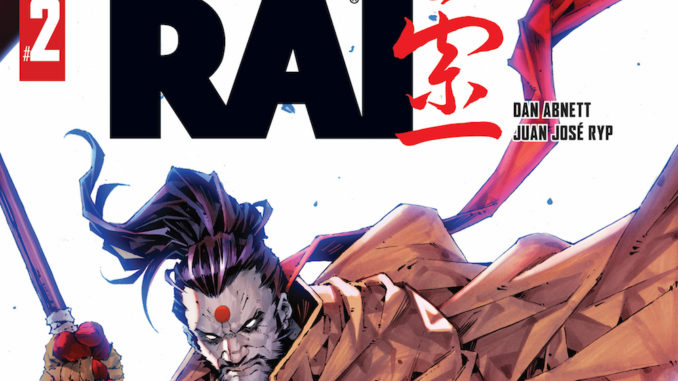
There’s a considerable amount to unpack when it comes to Rai’s behavior in issue two of this hero-titled comic book. The cover suggests a man strong and confident in his convictions. There is no Raijin and that should relay to the reader that Rai will be exhibiting poor decision making.
Raijin as the older brother understands his place in the world. He believes that once he finds Father’s fails-safes that Rai will destroy him as well. Perhaps it’s because he’s an early model and has a clear vision as to why and how he was created helps Raijin to know the difference between artificial intelligence and what Rai is continually evolving into. Though this is a comic book, pay attention to Rai’s language. He refers to the entity that created him as father and the AI he seeks to destroy as children. And on entering the Ghost Zone where one of Rai’s query is hiding in plain sight he tells Raijin that there are no such thing as ghosts. So his selective belief in social constructs can be perceived as being human since that may mean he has the cognitive ability to comprehend the choices he’s making. But if we’re going to go by that then Raijin is also evolving. However Rai’s constant apologizing to the AI they find on tracking down one of Father’s children is problematic. It’s as if Rai is associating being human with appearance since he addresses and destroys who he and Raijin are in pursuit of with disdain.
Still, intellectually both are machines generated to have a specific objective. The one that looks human is even more of an instrument as it continues to follow through on its programming to the detriment of itself. Yet, when faced with the AI who attempts to request help in getting away from a horrific situation, Rai treats it as the villain. Raijin on seeing these exchanges seems concerned and maybe realizes that he needs to have a real sit down with his younger brother.
For Raijin it’s a question of Rai’s motivations and what he deems to be soulless machines or sentient artificial-constructs in deciding who is worthy of surviving. If Rai only wants peace then what does that look like? Does this mean that all the machines that look human get to survive while all the robots, regardless of their potential to evolve be eliminated? It’s as one of Father’s children pleaded that it was asking for help. It is possible that it was attempting to manipulate Rai, but on reading you get the sense that if Rai had listened, he may have gotten more information or the truth that they’ve all in their own way are trying to separate themselves from Father. Not everyone is willing to be a puppet. Maybe his other siblings also want to be free.Â
By the end of ‘Rai’ figures come in also looking for information. It’s possible that the brothers are being followed and it’s unknown if what’s stalking them are people in robotic suits or fellow robots. The only thing that’s certain is that Rai is killing Father’s children so he doesn’t have a way to resurrect himself. But everything else leaves that quest perpetually in doubt. It’s a delicious narrative as Rai looks to be on a delusional hero’s journey. If nothing else you’ll be rooting for Raijin. He’s just too cool and pragmatic to done away with.

Leave a Reply